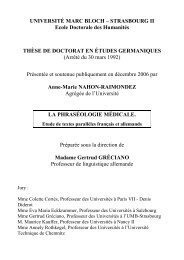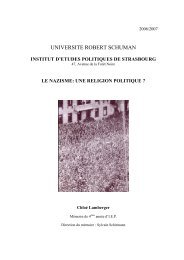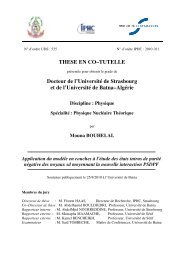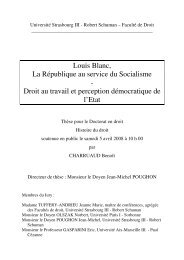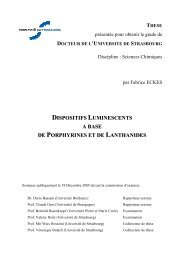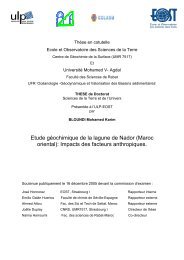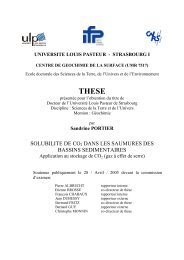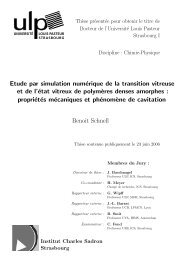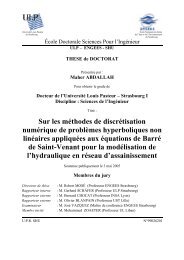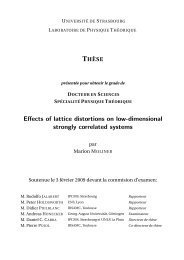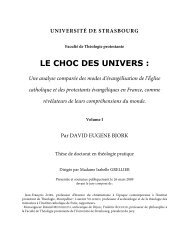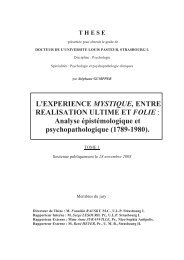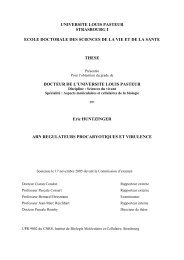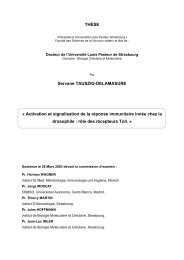Économie Évolutionniste et Culture d'Entreprise
Économie Évolutionniste et Culture d'Entreprise
Économie Évolutionniste et Culture d'Entreprise
Create successful ePaper yourself
Turn your PDF publications into a flip-book with our unique Google optimized e-Paper software.
évolutionniste en terme de “paradigme technico-économique” reste biaisée par la prise en compte à titre<br />
principal du changement technico-économique <strong>et</strong> la non-prise en compte du contexte socio-institutionnel.<br />
Coriat <strong>et</strong> Dosi (1998) ont essayé de remédier à c<strong>et</strong>te lacune. Ils ont considéré que les routines ne sont pas<br />
seulement des procédures de résolution des problèmes <strong>et</strong> qu’elles intègrent comme composante la marque<br />
des conflits, étroitement liée au contexte institutionnel (avec la mise en place de règles, d’habitudes <strong>et</strong> de<br />
pratiques collectives). Les routines seront envisagées sous leur double aspect en tant qu’interprétation<br />
politique des règles (largement incomplètes) <strong>et</strong> en tant que mécanismes cognitifs qui ont pour vertu de<br />
créer des automatismes <strong>et</strong> de faire émerger une mémoire organisationnelle au sein des firmes :<br />
[F]irms are crucial (although not exclusive) repositories of knowledge, to a large extent embodied in their operational routines,<br />
and modified through time by “higher level” rules pf behavior and strategies (such as their “m<strong>et</strong>arules” for innovative search,<br />
diversification, <strong>et</strong>c.). In this view, comp<strong>et</strong>ences are the collective property of the routines of an organization, and–due to their<br />
partial tacitness–are often hard to transfer or copy. (Coriat <strong>et</strong> Dosi, 1998, p. 103).<br />
In contemporary economies, a good deal of knowledge about technology and exchange governance is embodied in<br />
organizations (primarily business firms), which reproduce and augment it via institutionalised procedures ad “routines” that<br />
are only limitedly subject to strategic decision at each point in time. (Coriat <strong>et</strong> Dosi, 1998, p. 109-110).<br />
Coriat <strong>et</strong> Dosi (1998) défendent un double rôle des routines organisationnelles : un rôle cognitif <strong>et</strong> un rôle<br />
de gouvernance. A travers l’analyse de deux modèles–archétypiques de firmes, le modèle<br />
Tayloriste/Fordiste <strong>et</strong> le modèle Ohniste/Toyotiste, ils ont essayé de dégager la co-évolution des<br />
mécanismes de gouvernance <strong>et</strong> des compétences de la firme avec leur environnement (p. 111-112). C<strong>et</strong>te<br />
double nature des routines organisationnelles s’explique, aux yeux de Coriat <strong>et</strong> Dosi, principalement par<br />
l’inertie qui leur est sous-jacente :<br />
[S]uch an inertiality provides some degree of consistency among individual behaviors and motivations to action even if<br />
incentive compatibilities are much weaker than those prescribed by economic theory, and even if information about a changing<br />
and complex world borders pure ignorance. But precisely that same inertiality makes organizational arrangements quite<br />
differentiated, and, often highly suboptimal in their ability to seize technological and mark<strong>et</strong> opportunities. (Coriat <strong>et</strong> Dosi,<br />
1998, p. 112).<br />
L’établissement de relations stables peut être difficile à obtenir, mais il est aussi très difficile de rompre les rapports<br />
consolidés dans le temps par des initiatives nouvelles. La peur de briser la stabilité sociale (trêve) est une force qui<br />
maintient l’organisation dans une routine relativement rigide. Nelson <strong>et</strong> Winter (2003) expliquent le mécanisme de<br />
trêve par le fait que le comportement des agents est un principe d’économie de l’attention pouvant expliquer la<br />
défiance vis-à-vis du changement, tant au niveau des agents dans une position entrepreneuriale que nonentrepreneuriale<br />
:<br />
[S]ince every organization is a coalition of sorts, routines almost necessarily include ways of coping with the occasions for<br />
conflict within an organization, wh<strong>et</strong>her b<strong>et</strong>ween managers and shareholders, or managers and workers, or managers and<br />
managers. Departures from established routines provoke heightened anxi<strong>et</strong>ies and often involve heightened stakes; conflict<br />
therefore tends to be more intense—a contrast often noted in the context of labor–management struggles over organizing a<br />
union as compared to renewal of a union contract. Because conflict tends to be costly to all participants, there is reason to<br />
avoid it by sticking with established routines. (Nelson <strong>et</strong> Winter, 2002, p. 30-31).



